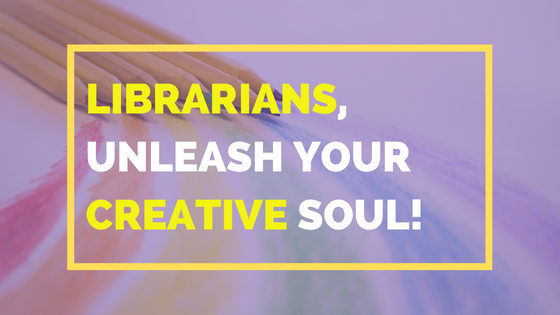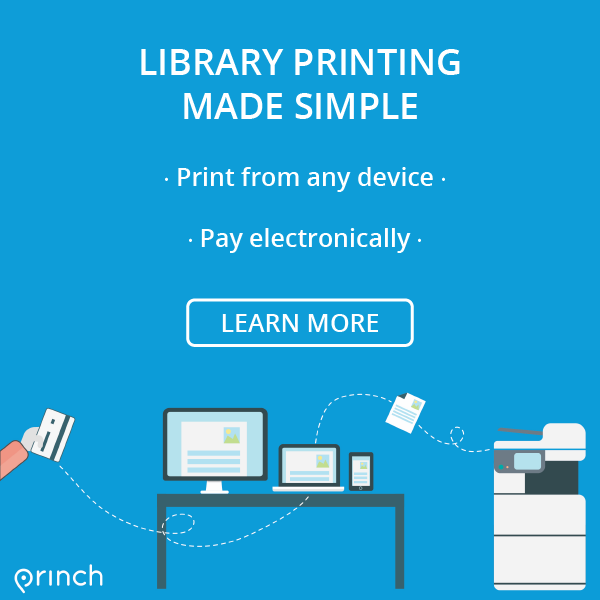In this week’s Princh Library Blog post, guest writer Sarah Pavey encourages all librarians to cultivate one of the most sought-after skills; creative, outside-of-the-box thinking.
Freedom and creativity
One of the joys of being a librarian is the autonomy that often accompanies the role. We can be free spirits and decide for ourselves what to provide for our users, whether physical books, digital products or our expertise. We can be creative and innovative knowing that our safe environment allows for graceful failure at times, prompting us to experiment and take risks to improve our offerings. In schools, teachers and students can be stifled by the constraints of a curriculum and yet we know as information professionals how important it is to develop competencies for life. Without practising the ability to think critically and step outside the box in our approaches to problem solving, there would be little progress in society. Many of the world’s most successful inventions have come about by accident, such as the discovery of Penicillin. How can we help to develop such competencies in our libraries? Here are some ideas:
Learn the key aspects of Princh! Watch our on-demand demos at your convenience and see what makes Princh such a simple solution. Watch our demos here.
Maker spaces and curiosity cabinets
Making and handling unusual objects can spark the need to ask questions. A curiosity cabinet or drawer filled with strange pieces from the past such as old photograph albums, fossils, old fashioned games can be left for library users to explore. Maker spaces do not have to have the latest 3D printers and laser cutters but can be filled with scrap materials and coloured textured paper or wool and knitting needles for crafting. Instead of throwing out your old books think about recycling to encourage book art in your maker space! Designating a small area for a hands-on experience can encourage users to collaborate on projects and discover common interests. Such spaces can be designed to fit budgets from inexpensive and easy to maintain to the latest high-tech digital products requiring expert guidance.
Mashup physical and digital worlds
Research tells us that as humans we learn better when exposed to a multisensory approach. These days there are many Apps on the market designed to link the physical and digital worlds. Many embrace virtual reality bringing stories, places and objects to life in an immersive experience. Imagine holding a Roman artifact in your hands and being able to turn it around to see all parts – products such as the Merge cube can realise this. Some Apps will construct a portal so you can walk from the library into a virtual space – imagine climbing through a wardrobe door into Narnia. Other Apps will bring stories alive by turning your written words and actions into characters that do as you command. This demonstrates the impact of our text on others and how writing, action and oracy are all linked as forms of communication, skills so necessary for society and global citizenship.
Interactive displays
How often do we think about the impact of the displays in our libraries? Are they just there to look good decoratively or do we make them work for us challenging preconceptions, prompting discussions, leaving our users hungry to find out more? How do we gather feedback on our creations and how do we know how library users have used the information we provided? By making displays more interactive we may find answers to these questions and at the same time promote creativity and innovation. We can get technical and use QR codes or visual recognition Apps such as EyeJack to link pictures or text to videos, audio clips, or websites to give further information. But what if we used this same technology to link to a poll or survey as well? Interactivity does not have to be technical – the same result can be gained by having a feedback wall with sticky notes or jars in which people can place beads for voting.
Lessons to learn
In education institutions, we may need to be more explicit about how developing creativity can impact students as they progress through year groups, demonstrating that this is a valuable and essential life skill. Research shows that as we grow as a society towards a future where intelligent robots may compete for our jobs, those competencies in non-cognitive, non-routine decision making will be a key to success. A simple lesson is to give out cards to a class relating to UN Sustainable Goals and then to ask them in groups to debate how such issues would be resolved if there was no further innovation.
As librarians, we hold the power to guide our users towards expanding their creative talents in many ways. Our expertise in technology and social media enables us to spread the message and invite people to enjoy experimentation and risk taking. We can provide resources to underpin our imaginative environments whether that is the latest technology, a simple board game or a place to discuss new ideas and collaborate with others. Go innovate today!
Sarah Pavey
Sarah Pavey is an education consultant and librarian based in Epsom in the UK. She has worked in school libraries for over 20 years and now conducts training and provides consultancy for many types of school spanning all age groups both in the UK and internationally. She holds Fellowship of The Chartered Institute of Library and Information Professionals (CILIP) and The Royal Society of Arts (RSA). During the COVID lockdown she wrote Playing Games in the School Library which blends pedagogy with practical case studies about game-based learning and gamification and is full of creative ideas. She has also written chapters for Creating a School Library with Impact and is part of the team designing the free Open University Course “An introduction to school librarianship”. Sarah also uses her creativity as an accomplished professional folk musician playing and singing in several bands.
Twitter @Sarahinthelib
Website https://www.sp4il.co.uk/
Linkedin https://www.linkedin.com/in/sp4il/
Facebook https://www.facebook.com/sp4il/
Instagram https://www.instagram.com/sarahpavey1/
Email sarahjpavey@gmail.com
Recent posts
Green Libraries: How Sustainable Design is Shaping the Future of Public Libraries
In this week's Princh Library Blog post, recurring guest writer Sam L. Bowman discusses an ever so important topic: sustainable design and [...]
Librarians Supporting Digital Literacy in the Community
In this week's Princh Library Blog, Nina Grant covers why digital literacy is important, the variety of ways in which librarians are supporting [...]





Leave A Comment